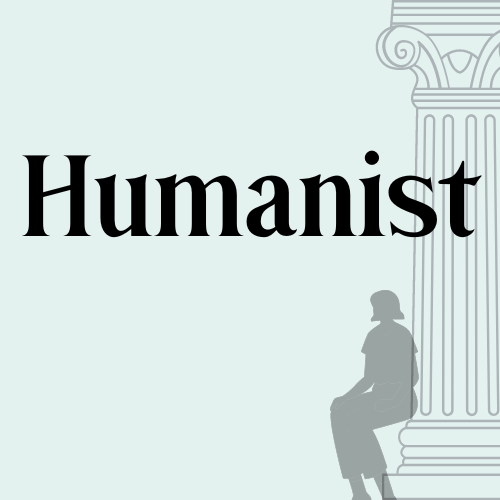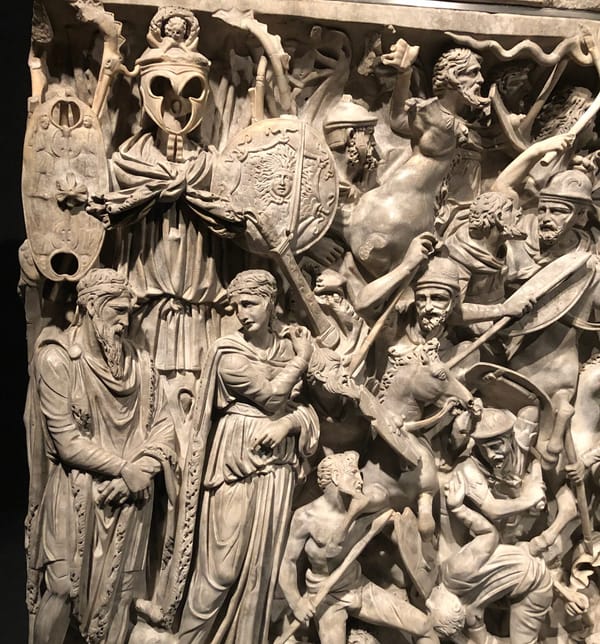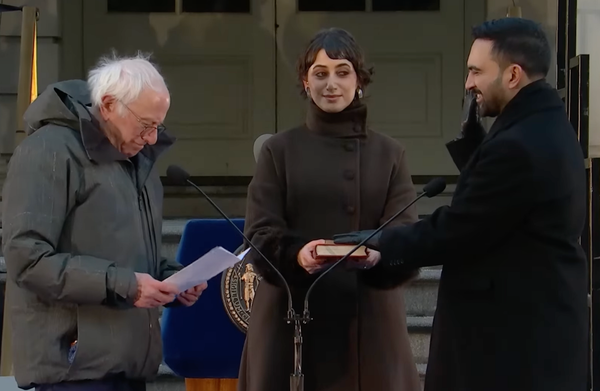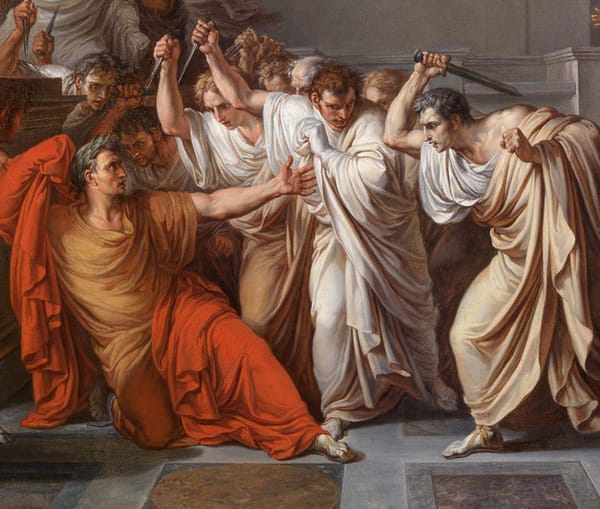The hermeneutics of #BookTok; or, Getting students to read more
Reading is hard. It requires greater focus and concentration and attention than looking at photos or memes. The dopamine hits that bombard TikTok users are hard to come by in books. What does BookTok have to teach us about motivating students to read?
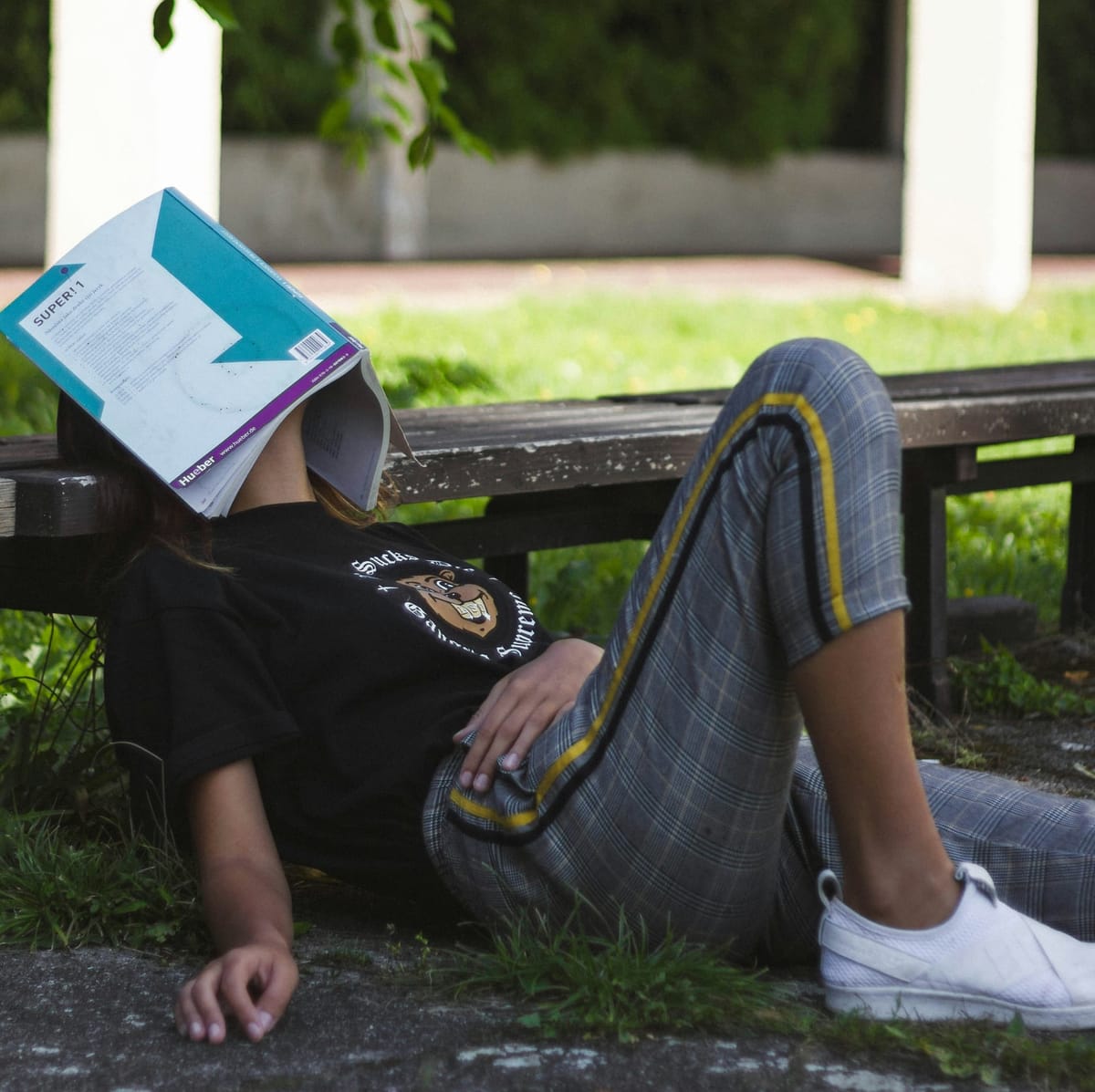
My nighttime reading for the last few years has mostly been escapist fantasy, some good and some not very good but still enjoyable. This led me into the delightful world of BookTok (and Bookstagram, now that I've detoxed from TikTok for political and time management reasons).
On TikTok and Instagram, a vibrant community of voracious readers – mostly young white women, but not all – share reviews and roundups of what they've been reading, as well as fan art (mostly AI-generated) and audiovisual collages meant to evoke a book's general vibe. For the authors lucky enough to catch on with BookTok, there must be a feeling of having won the lottery, because a thirty-second video can turn your book into a viral sensation.
Although some people worry that "kids these days" don't read anymore or can't focus on anything longer than a Tweet, in the world of BookTok, that is definitely not a problem. I am particularly charmed by the videos where women get their boyfriends to read a book they've already read and loved, and periodically check in with how their partner is feeling about the plot or particular characters. You see a sense of joy in seeing the book through someone else's fresh eyes, and a little bit of lording one's knowledge over a newbie, as well as tension while testing what a partner finds appealing or acceptable in a male character's behavior.
Many BookTok content creators use their videos to call out the diversity of authors and characters, or the lack thereof, and to debate the ethical or political stances of authors (some creators recently called for a boycott of authors who expressed Zionist views). The identification of basic literary tropes becomes a form of social capital. "If you liked Fourth Wing and you're desperate for the next book to come out, here are some other books centered on dragons and regime change that you might like while you're waiting!"
I did, in fact, like Fourth Wing (and other books about dragons and regime change), and recently read the third installment of the planned five-book series building on it. The release of this third installment, Onyx Storm, elicited lines at bookstores that reminded me of going to Borders (RIP) at midnight in 2005 to buy the sixth Harry Potter book. When I finished Onyx Storm, I went on Instagram to see what my fellow readers were saying (mostly because I felt so unsatisfied by the book, but that's not the point). I found that one reader had posted seven long videos so far and still hadn't made it all the way through her analysis of the book, mostly theories about what was foreshadowed to happen in the next installment. She brandished a book bristling with bookmarks and sticky notes, exhausted by her manic detective work in excavating clues and Easter eggs. "I have receipts!" she crowed, promising to provide quotations and page numbers that would corroborate her theories.
"Why can't I get students to read with that level of attention?" I wondered. She looked like she could be a student herself; is she bringing that level of critical thinking to her courses, or is she turning in assignments late because they're on the back burner while she's making Instagram content?
Are students struggling more than usual to read?
I'm always suspicious of narratives of moral and cognitive decline among kids these days, but in this case, students really do seem to be less prepared for college-level reading assignments than they used to be. An article in the Atlantic last October explored the curious phenomenon of "The Elite College Students Who Can't Read Books" in Lit Hum at Columbia. In December, a similar article in the Chronicle of Higher Education focused on the same topic. Both article mention social media and smartphones and our declining attention spans as a possible cause – great thinkers of the past didn't have such entertaining little attention grabbers to compete with their libraries, and in any case, people with ready access to libraries have been a tiny minority, historically speaking. But more importantly, these articles point to educational reforms as a major culprit:
But middle- and high-school kids appear to be encountering fewer and fewer books in the classroom as well. For more than two decades, new educational initiatives such as No Child Left Behind and Common Core emphasized informational texts and standardized tests. Teachers at many schools shifted from books to short informational passages, followed by questions about the author’s main idea—mimicking the format of standardized reading-comprehension tests. Antero Garcia, a Stanford education professor, is completing his term as vice president of the National Council of Teachers of English and previously taught at a public school in Los Angeles. He told me that the new guidelines were intended to help students make clear arguments and synthesize texts. But “in doing so, we’ve sacrificed young people’s ability to grapple with long-form texts in general.”
Mike Szkolka, a teacher and an administrator who has spent almost two decades in Boston and New York schools, told me that excerpts have replaced books across grade levels. “There’s no testing skill that can be related to … Can you sit down and read Tolstoy? ” he said. ("The Elite College Students Who Can't Read Books," from The Atlantic)
College students are less prepared to read (and understand, and enjoy) books because they've never done it before, at least in school. Reading is a discipline, and disciplines require willpower as well as gradually increasing practice to build up stamina. Harvard's Project Zero offers Thinking Routines that can be used to facilitate discussion of all kinds of texts, with the idea that these routines should become ingrained habits of critical thinking over time.
As an adult, I have often been irritated as I reflect on gym class in school: if they wanted me to run a mile or do a pull-up or whatever, why didn't anyone try to teach or prepare me to do that, instead of just testing me randomly and sending me into adulthood believing that I'm "just not athletic"? No growth mindset there, not at all student-centered. The same applies to reading books, especially those that are more sophisticated than Onyx Storm; throwing all of Herodotus at a student who's only ever been asked to read paragraphs is terrifying to them.
Should assignments be shorter?
One solution to this problem, for the professors interviewed in the Atlantic piece and in general, has been to assign fewer books, shorter ones, or both. Of course, you don't have to choose one or the other: you can start out with shorter passages and build up to longer assignments, over the course of a semester or while working through a single book. You might do a close reading of the opening of the Iliad before assigning a few pages as homework, building up to a book or two a week.
I'm reminded of a pedagogical debate in my grad department: how much reading in Latin or Greek should one assign to graduate students? After all, they have chosen to be professional readers and to produce content – essays and articles rather than TikTok videos, much more work for probably much less profit – about what they've read.
One camp favored shorter assignments, with an expectation of more granular study and preparation for discussion in class. I sometimes had enough time to read these shorter assignments through twice, so that I was a lot better prepared to translate and analyze them in class. I felt more confident of my learning in those classes, and less disoriented (or even panicked) in discussions.
The other camp favored voluminous assignments that seemed impossible to many of us. One interpretation: these impossible tasks were no-win scenarios that forced students to prioritize and do the best they could, which is useful training for managing an academic's workload. Another interpretation: since all of that reading would someday be fair game for our translation exams, the more we could rush through, the better, however much that turned out to be. The best prepared grad students, the ones who had been reading Latin and Greek for a decade or more, might make it through the whole assignment, leaving others (including me, then a paltry four years into my study of Latin) in their dust. But none of us were held accountable for how much reading we did or did not complete.
In the context of undergraduate education, it is not generally considered to be a best practice to present students with no-win scenarios, to put it mildly. There's no reading list or translation exam looming as a benchmark, and no vague sense of "things one should read." We are asked instead to identify specific learning goals or objectives, and to choose readings that will take students on the most direct path to those objectives. We are asked to verify and assess whether or not students have met those objectives. We may be asked to keep quantities of reading within designated credit hours, calculated according to the reading speed of an average student rather than the best-prepared ones. That curriculum design process, with its demands for intentionality and accountability, certainly points to the "less is more" approach.
Lessons from BookTok
It's genuinely important that students strengthen this reading muscle. Yes, AI can summarize individual texts for them or produce what looks like a review of a broad topic, but it frequently does a bad job. Reading is how we develop expertise, and expertise is how we know when AI has done a bad job, in any profession and in our personal lives. Reading attentively and thoughtfully also helps to develop empathy and to spark new insights and thoughts that you just can't arrive at by other means. I love movies and TV as much as anyone, but they will just never illustrate the interiority of a character the way a great book can.
So what does BookTok have to teach us about motivating students to read?
- Lower expectations
To state the obvious, the books we assign in higher ed are not as readable as fast-paced, action-packed, dragon-populated romantasy novels. A few months ago, I saw Angela Davis speak at Swarthmore (to an auditorium so packed that another auditorium next door had to be opened and set up as overflow seating). Her interlocutor was Dr. Lucius T. Outlaw III of Howard University, her longtime friend and comrade. The two reminisced about reading philosopher Herbert Marcuse as college students. I'd never heard of Marcuse, but he had an enormous influence on activist students of that era with works like One-Dimensional Man:
Does not the threat of an atomic catastrophe which could wipe out the human race also serve to protect the very forces which perpetuate this danger? The efforts to prevent such a catastrophe overshadow the search for its potential causes in contemporary industrial society. These causes remain unidentified, unexposed, unattacked by the public because they recede before the all too obvious threat from without--to the West from the East, to the East from the West. Equally obvious is the need for being prepared, for living on the blink, for facing the challenge. We submit to the peaceful production of the means of destruction, to the perfection of waste, to being educated for a defense which deforms the defenders and that which they defend.
If we attempt to relate the causes of the danger to the war in which society is organized and organizes its members, we are immediately confronted with the fact that advanced industrial society becomes richer, bigger, and better as it perpetuates the danger. The defense structure makes life easier for a greater number of people and extends man's mastery of nature. Under these circumstances, our mass media have little difficulty in selling particular interests as those of all sensible men. The political needs of society become individual needs and aspirations, their satisfaction promotes business and the commonweal, and the whole appeals to be the very embodiment of Reason.
And yet this society is irrational as a whole. Its productivity is destructive of the free development of human needs and faculties, its peace maintained by the constant threat of war, its growth dependent on the repression of the real possibilities for pacifying the struggle for existence--individual, national, and international. This repression, so different from that which characterized the preceding, less developed stages of our society, operates today not from a position of natural and technical immaturity hut rather from a position of strength. The capabilities (intellectual and material) of contemporary society are immeasurably greater than ever before--which means that the scope of society's domination over the individual is immeasurably greater than ever before. Our society distinguishes itself by conquering the centrifugal social forces with Technology rather than Terror, on the dual basis of an overwhelming efficiency and an increasing standard of living. (Herbert Marcuse, One-Dimensional Man)
Did reading that excerpt feel difficult or frustrating? Did you make it through the whole thing? Could you explain it to someone else? Are you annoyed with me for posting such a long passage? Lucius Outlaw, at the end of his conversation with Angela Davis, urged the students in the room to read Marcuse, but he warned them: YOU WON'T LIKE IT. You'll find wonderful ideas there but it will be a miserable slog, especially when you're just starting out and don't have a feel yet for Marcuse's style. Reading is hard. Outlaw specifically called out the room full of students for their short attention spans, calibrated to TikTok videos, and told them to put in the work to read a whole book to educate themselves about how the world really works. I wished Angela Davis had been the one to say this, because the students (and educators) in the room were hanging on her every word, and I hoped that Outlaw's words wouldn't be dismissed out of hand.
Reading is hard. It requires greater focus and concentration and attention than looking at photos or memes. The dopamine hits that bombard TikTok users are hard to come by in books. The willpower to turn off the TV or put down the phone is a finite resource. We, esteemed classical scholars, know this from our own experience of getting distracted from work or lectures by our phones, or skipping to the end of a long excerpt from Herbert Marcuse.
Thus, it's worth saying to students up front that reading whatever texts you assign will be hard, and that it is normal to feel confused, challenged, and even frustrated while they do it, especially at first. Ask them: what conditions do you need to concentrate on this difficult task? Where, when, and how will you set up these conditions for yourself? I heard an astonishingly erudite lecture on Marxism once from the leader of the New Black Panthers, who had studied Marxist thought deeply in prison, a setting defined by conditions of time and lack of more entertaining activities (although radical philosophical texts are not always permitted).
You can make the task less challenging, especially at first, by providing reading questions that students should answer by the end of their reading. You can also provide an outline or graphic organizer for them to fill in, to help them figure out which details or features need their attention. This can include the sort of questions BookTok creators raise:
- What do you think this character is going to do later in the book? Why?
- What perspectives are included in the narrative, or excluded from it?
- What do you need to understand about the world being built in the narrative, in order to fully appreciate the story?
- What tropes or features do you see in this book that are also present in other books or media you know?
I used to have students submit a paragraph answering a reading question before class on Canvas/Blackboard, and only graded it for completion (low stakes for them, quick for me). The first one of the semester: what are Achilles and Agamemnon fighting about in Iliad Book 1, and who do you agree with more and why? It led to an interesting conversation about gender norms, i.e. why Greek heroes cry so much.
Finally, offering audiobook and/or video options in addition to written text might encourage a few more students to read the text in a more accessible way.
- Encourage weirdness
Requiring students to make a BookTok-style video about the Iliad is probably cringeworthy, but showing one such video as an exemplar might give them ideas, and allowing video submissions as an assignment option might be helpful. Or a storyboard, or a slide deck, or whatever format makes sense to them. One of the principles of Universal Design for Learning is to "provide multiple means of action and expression" in student work, to accommodate all kinds of "learner variability." Providing several different reading questions or prompts – or encouraging students to generate their own questions – is another way to engage different students with different interests.
For John Dewey, this is not just a question of making education more engaging or pleasant, but a matter of sustaining democracy and freedom from authoritarianism:
The individual who has a question which being really a question to him instigates his curiosity, which feeds his eagerness for information that will help him cope with it, and who has at command an equipment which will permit these interests to take effect, is intellectually free. Whatever initiative and imaginative vision he possesses will be called into play and control his impulses and habits. His own purposes will direct his actions. Otherwise, his seeming attention, his docility, his memorizings and reproductions, will partake of intellectual servility. Such a condition of intellectual subjection is needed for fitting the masses into a society where the many are not expected to have aims or ideas of their own, but to take orders from the few set in authority. It is not adapted to a society which intends to be democratic. (John Dewey, Democracy and Education, 1916)
- Ask for receipts
A good use of class time is to challenge students to find quotations, passages, or events to corroborate interpretations or answer questions about a text, especially if those interpretations or questions came from the students themselves. John Dewey called this the essence of logic, one of the most fundamental skills that education ought to help students to develop: human beings draw inferences and conclusions all the time, often wrong ones, and must learn to be more conscious and critical in drawing and evaluating those inferences. Students typically struggle with this and need better support. ChatGPT, I will add, is (as yet) chronically inept at this: it usually fabricates receipts, even on the occasions when it manages to generate a correct answer, which isn't all that often. All the more reason for students to learn to do this for themselves.
- Read in community
The thing that powers BookTok and Bookstagram isn't books; it's community. Literary tropes, book reviews, analysis, and genre conventions are social capital. This is why people have book groups IRL. Building community in classrooms can help to replicate the same sense of shared discovery, accountability, and motivation. Once you've built that community, you may want to invite students to come up with their own discussion questions or take turns facilitating, to give their thoughts and interpretations more prominence.
Further reading
Lemov, Doug, Colleen Driggs, and Erica Woolway. 2016. Reading Reconsidered : A Practical Guide to Rigorous Literacy Instruction. 1st ed. San Francisco, CA: Jossey-Bass & Pfeiffer Imprints, Wiley. The authors also ran a blog, "Teach Like a Champion."
"Reading Strategies for College Students" by Althea Need Kaminske on the "Learning Scientists" blog.
